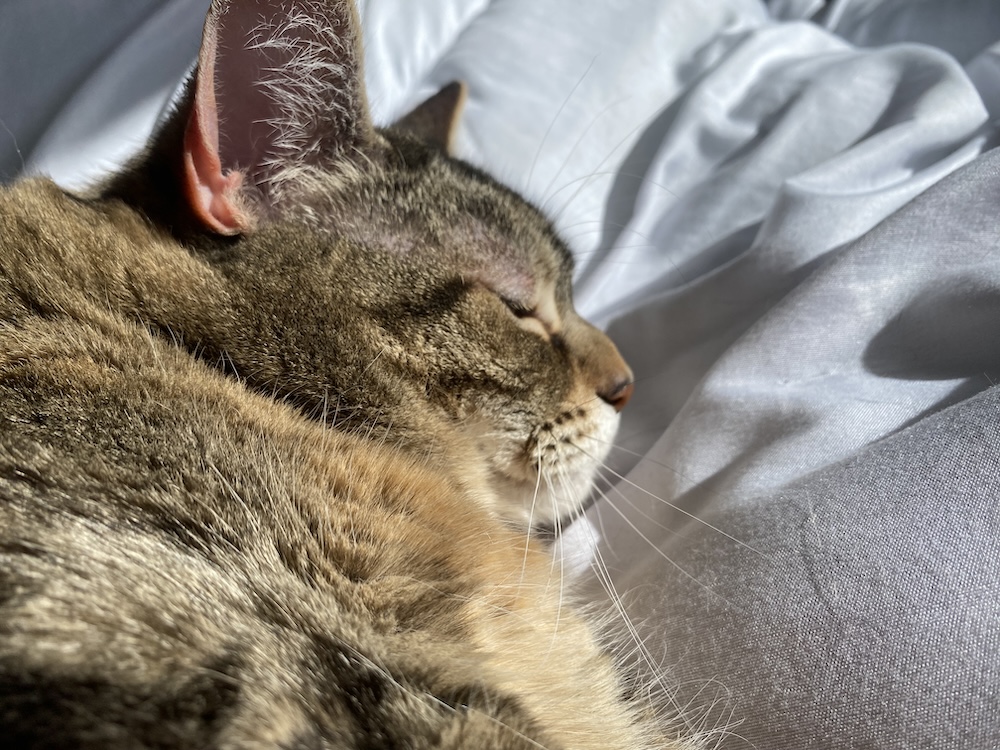Hi, I’m Dr. Lauren! Read my introduction to learn more about me and my two adventurous cats, Pancake and Tiller.
Cats get into all sorts of mischief. And that’s bad enough. But some of the seemingly normal things cats do, can also add complications to their lives. And, here comes the sun, so to speak.
We all love a sunbathing feline. They look so happy, so content. Sleeping, rolling, they even seem to be able to change position while half asleep to remain in the perfect sunbathing position following the rays around the house.
Pancake and Tiller both love a good sunbath. Because they spend little unsupervised time outdoors, they mostly do their sunbathing during the day, inside. And it doesn’t take them long to find the best spots to catch those seasonal rays…the bed, the hallway, and even sometimes (yes, I admit it) ever since the cats on counters photoshoot, Tiller finds a sunny spot on the kitchen table now and again.
What’s the Problem with Sunlight?
In many species, the sun has a physiological effect, to help bodily conversion of vitamin D. This vitamin is traditionally thought of as an important factor in bone health, but newer research shows that in multiple species, vitamin D receptors can be found in cells throughout the body, and that it may actually play important roles in regulating or preventing cancer, as well as decreasing the risks of cardiovascular disease, autoimmune issues, and infectious diseases. However, in cats, they acquire the majority of their vitamin D through dietary intake, considered an evolutionary adaptation as they ingest the vitamin D stored in the liver of their prey.
So, while cats may not need the vitamin D-boosting effects of the sun, they may derive other benefits. As their basal body temperature is higher than humans (anywhere from around 38.1-39.1 degrees Centigrade), they may simply benefit from the elevated levels of heat. And certainly, there may be multiple other factors that contribute to the feline love of a good sunbath.

The Downsides of Sunbathing
But with the pros, come the cons. Even indoor sunbathing can increase the risks to the sunbather. The sun can irritate the skin, causing redness, drying and even scabbing in a condition called actinic (solar) dermatitis. Left unchecked, this can potentially progress to full blown skin cancer. This is most commonly seen in cats that have little pigmentation or hair on their ears and noses, where the disease commonly occurs. Older cats, especially those on medications such as corticosteroids, that commonly sunbathe, can also experience haircoat bronzing—where darker shades of the coat become lighter, or bronzed.
How to Mitigate the Risks
Now, this doesn’t necessarily mean you need to stop your cats’ sunbathing altogether. However, some options can help mitigate the risks and are fairly straightforward:
- Consider a pet-safe sunscreen for your cat’s ears and nose, if they receive high levels of sun exposure.
- Shut the blinds, or get a UV film application for the windows, to reduce the UV entering the house, which does most of the sun damage to skin
- Limit the amount of time your cat can spend outside during the hours of most direct sunlight
- Ensure you have regular vet checks for your cat, as if actinic dermatitis is caught early, it is much easier to address.
As those of us in the Northern Hemisphere approach the warmer months, it doesn’t mean that we have to curtail our cats’ sunbathing entirely. However, there is nothing wrong with playing it sun safe, and sun smart! Or, as the Aussies say: slip, slop, slap to prevent sun-induced cancer in their sun-loving human population. No reason not to take the same preventative measures with your own sun-loving feline, and find what works best for you.
Source link

